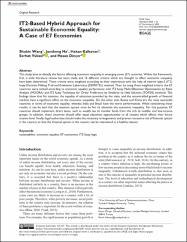| dc.contributor.author | Wang, Shubin | |
| dc.contributor.author | Ha, Junsheng | |
| dc.contributor.author | Kalkavan, Hakan | |
| dc.contributor.author | Yüksel, Serhat | |
| dc.contributor.author | Dinçer, Hasan | |
| dc.date.accessioned | 2020-07-07T13:19:48Z | |
| dc.date.available | 2020-07-07T13:19:48Z | |
| dc.date.issued | 2020 | en_US |
| dc.identifier.citation | Wang, S., Ha, J., Kalkavan, H., Yüksel, S. ve Dinçer, H. (2020). IT2-based hybrid approach for sustainable economic equality: A case of E7 economies. Sage Open, 10(2). https://dx.doi.org/10.1177/2158244020924434 | en_US |
| dc.identifier.issn | 2158-2440 | |
| dc.identifier.uri | https://dx.doi.org/10.1177/2158244020924434 | |
| dc.identifier.uri | https://hdl.handle.net/20.500.12511/5413 | |
| dc.description.abstract | This study aims to identify the factors affecting economic inequality in emerging seven (E7) countries. Within this framework, first, a wide literature review has been made and 12 different criteria which are thought to affect economic inequality have been determined. These criteria were weighted according to their importance with the help of interval type-2 (IT2) fuzzy Decision-Making Trial and Evaluation Laboratory (DEMATEL) method. Then, by using these weighted criteria, the E7 countries were ranked according to economic equality performance with IT2 fuzzy Multi-Objective Optimization by Ratio Analysis (MOORA) and IT2 fuzzy Technique for Order Preference by Similarity to Ideal Solution (TOPSIS) methods. The findings show that fair taxation, the equality of education provided by the state, and the uncontrolled growth of financial markets have a significant effect on the economic inequality. On the other side, Russia and China are the most successful countries in terms of economic equality, whereas India and Brazil have the worst performances. While considering these results, it can be said that the taxation system must be fair to eliminate the economic inequality. For this purpose, E7 countries should implement direct taxes, such as wealth tax to transfer funds from the rich to middle- and low-income groups. In addition, these countries should offer equal education opportunities to all citizens which affects their future income level. Finally, legal authorities should make the necessary arrangements and prevent excessive risk of financial system in the country so that the financial system in the country can be maintained in a healthy manner. | en_US |
| dc.description.sponsorship | Information Industry Development Research Center (IIDR) at Xi'an University of Posts and Telecommunications | en_US |
| dc.language.iso | eng | en_US |
| dc.publisher | SAGE Publications Inc. | en_US |
| dc.rights | info:eu-repo/semantics/openAccess | en_US |
| dc.rights | Attribution 4.0 International | * |
| dc.rights.uri | https://creativecommons.org/licenses/by/4.0/ | * |
| dc.subject | Sustainability | en_US |
| dc.subject | Economic Equality | en_US |
| dc.subject | E7 Economies | en_US |
| dc.subject | IT2 Fuzzy Logic | en_US |
| dc.title | IT2-based hybrid approach for sustainable economic equality: A case of E7 economies | en_US |
| dc.type | article | en_US |
| dc.relation.ispartof | Sage Open | en_US |
| dc.department | İstanbul Medipol Üniversitesi, İşletme ve Yönetim Bilimleri Fakültesi, Uluslararası Ticaret ve Finansman Bölümü | en_US |
| dc.authorid | 0000-0003-4482-0505 | en_US |
| dc.authorid | 0000-0002-9858-1266 | en_US |
| dc.authorid | 0000-0002-8072-031X | en_US |
| dc.identifier.volume | 10 | en_US |
| dc.identifier.issue | 2 | en_US |
| dc.relation.publicationcategory | Makale - Uluslararası Hakemli Dergi - Kurum Öğretim Elemanı | en_US |
| dc.identifier.doi | 10.1177/2158244020924434 | en_US |
| dc.identifier.wosquality | Q3 | en_US |
| dc.identifier.scopusquality | Q2 | en_US |




















